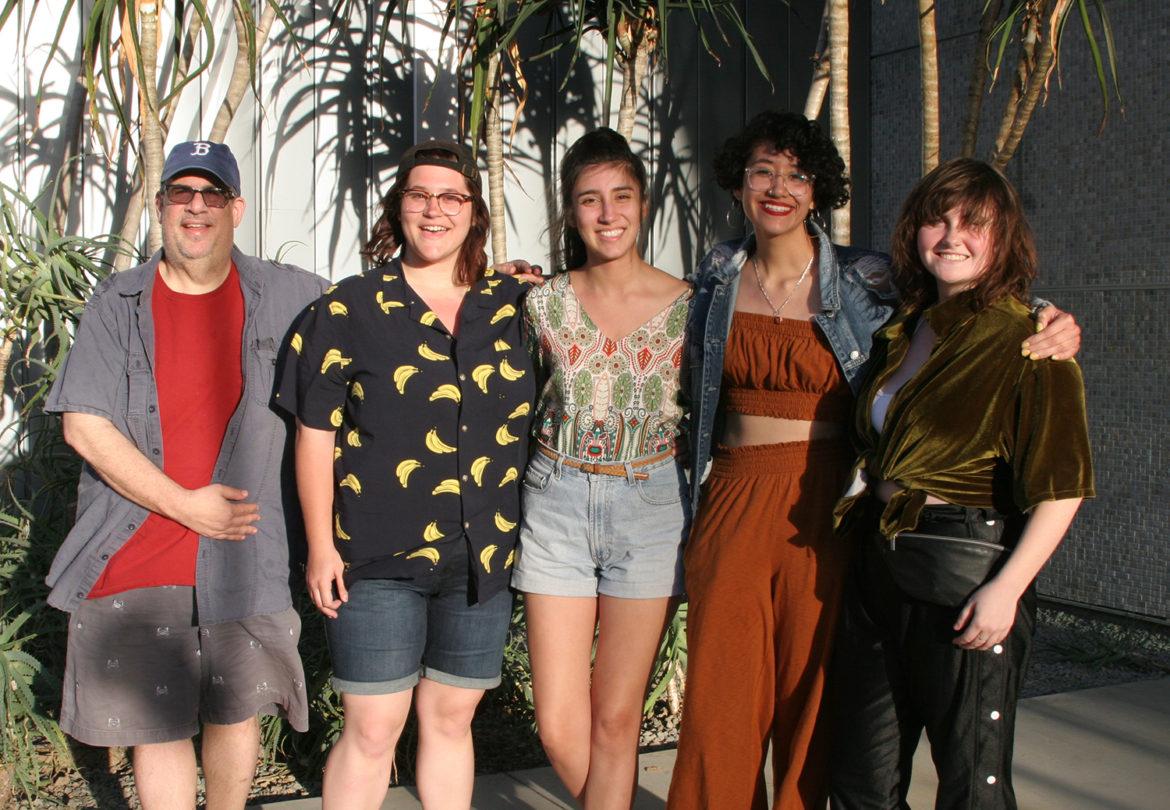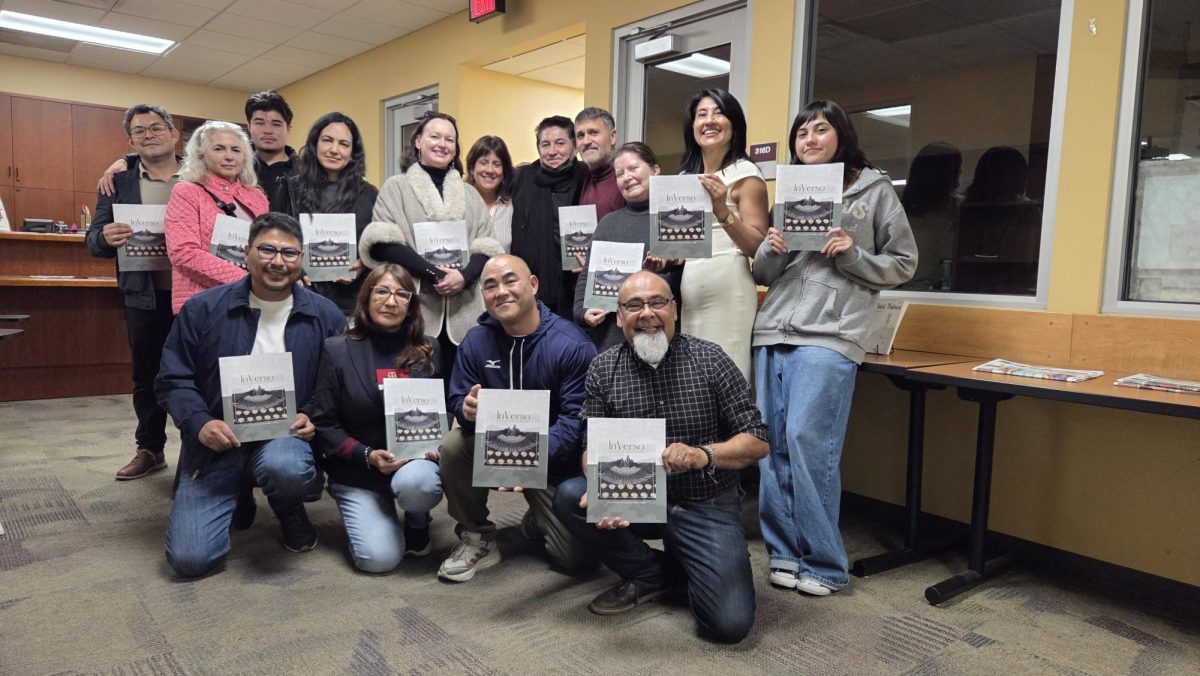A quartet of talented student-directors is bringing their passions and perspectives to bear, directing Tennessee Williams’ “A Streetcar Named Desire” with some experimental twists that put a modern spin on the timeless classic.
The co-directors, Nina Gioiosa, Vitoria Villalobos, Hannah Peterson and Darian Ramirez, are working together under the artistic direction of Professor Larry Biederman to bring the seminal play to life, which opens this weekend at the Experimental Theatre at The Soraya.
Each of the co-directors approach the craft of directing from a different angle and concern. Gioiosa, an experienced stage manager, sees theatre as serving a critical function in our society. Plays such as the one she is helping to produce allow us to feel — rather than repress — our emotions.
“I think that all of us don’t spend enough time each day letting ourselves feel and just experience our emotions,” she said. “I think that that level of self-reflection is so important and theatre is such a valuable space for that.”
One of the core tasks for the four young co-directors has been to create such a space, and though it is challenging, it is a process that they have all really taken to.
“There really is nothing like directing,” Gioiosa said excitedly.
She views directing as the craft responsible for designing the moment-to-moment aesthetics that enable both the performer and spectator to feel. While audience members may be in for the ride of emotions they see play out on stage, it seems that those directing the work are the ones who experience true satisfaction.
“You get to watch the audience experience the art, which is just so special,” Gioiosa said. “There’s nothing like seeing people respond to things live and in the moment, especially when you know all the individual steps it took to get everyone to that point.”
Gioiosa and her co-directors are learning, and enjoying, firsthand just how meticulous the craft can be.
“We design everything for the performance but every little step that it takes to get there is calculated and hard and involves lots of communication,” Gioiosa said. “That’s just a process I am so in love with.”
That creative process is really benefiting from having a brain trust of passionate and creative women of diverse backgrounds striving together to both realize the classic and express unique voices.
Villalobos cites her passion for the intensely collaborative nature of stage production that she likens to a “machine.”
“I really fell in love with ‘the machine’ that theatre can build in a community where everyone works to form one project,” she said. “There’s costume designers, lighting designers, and there’s the tech side, there’s the management side, acting, and vocal coaches, and choreographers, and directors. The biggest group of people to form one beautiful piece of art.”
Along with her other co-directors, Villalobos has been able to draw on and express multiple passions in theatre. She chose CSUN because she was able to double major in both theatre and deaf studies, melding her two passions, which informs her approach to directing.
“We need to take our lived experiences and meld them and make them into art that speaks to people,” said Villalobos.
Drawing on both personal identity and a range of passions is what also drives fellow co-director Peterson, a queer-identifying person studying human sexuality and queer studies along with theatre. Like Villalobos, Peterson chose CSUN because it enabled her to realize herself by synthesizing both academic interests and creative endeavors.
“I’ve been so blessed to be able to merge my fields — queer and human sexuality and theatre — all in one,” Peterson said. “So I’ve been really fortunate to have that and grow from that.”
Peterson is also passionate about the community that theatre fosters along with the social and political dimensions of performance art. For her, such art has the ability to challenge repressive social norms and discourses. It can disrupt deeply entrenched narratives and provide voices to the neglected.
“You can come in expecting the stereotypical ‘Streetcar,’ but you can leave learning a lot more than you ever expected,” she said. “There are perspectives in our show told from people whose voices often get neglected. There are moments in the show that we’ve looked at and have decided that’s poor representation in 2019 or that’s not the lens we need to be looking at it from.”
To realize these ambitions, the group of co-directors is toeing the line between experimental stage directions and staying true to Williams’ original piece. True to the name of the Experimental Theatre in which the play will be showing, the directors have employed some interesting experiments in form.
For example, in one scene in which Stanley — most famously played by Marlon Brando in the 1951 film — and the fragile Blanche are trading barbs, the directors have opted to use two Stanleys. The two Stanleys pace the room in opposite directions, alternating his lines with Blanche in the middle.
It’s a direction that serves to underscore the power Stanley exerts over Blanche, and perfectly captures her increasing sense of psychological disintegration under that pressure. And when the two Stanleys each pick up their chairs and walk to opposite sides of the stage and slam them down in unison, the directors know they are definitely on to something.
“I think there’s something very special about student-produced work, and the support of students for other students,” co-director Ramirez said. “I think it is really special because we may never have that chance again to be so close and be at such a rudimentary stage where we can experiment.”
Like her fellow co-directors, Ramirez, a senior theatre major, is driven to learn and do as much as possible before finishing her degree. She has challenged herself to pursue her passions and get out of her comfort zone, trying things she previously never imagined — such as directing.
“I actually never imagined directing until I took the class,” Ramirez said. “It was the one other thing that fed my soul as much as performing did. Something in my heart knew that I needed to take (the opportunity to co-direct ‘Streetcar’) and do as much as I can before I leave CSUN.”
If the rehearsals are any indication, it seems that these young women have been able to channel their passions, their interests and their concerns into “Streetcar” in a way that breathes new life into the classic while staying true to it. This is a production that the directors hope will inspire students and the community.
“Our ‘Streetcar’ is going to challenge the expectations of Tennessee Williams’ original piece, and it would hopefully inspire CSUN students to continue involving themselves in the arts, continue challenging norms and really attacking (the injustice) in our society,” Peterson said. “I think we’re a good representation of that.”
“A Streetcar Named Desire” will open at the Experimental Theatre at The Soraya on Friday, April 26 at 7:30 p.m. and will run until Sunday, May 5. For more information, visit https://www.csun.edu/mike-curb-arts-media-communication/theatre/events/streetcar-named-desire
4/24/17 Editors’ note: The story was corrected to state that the event begins this weekend not the next.












